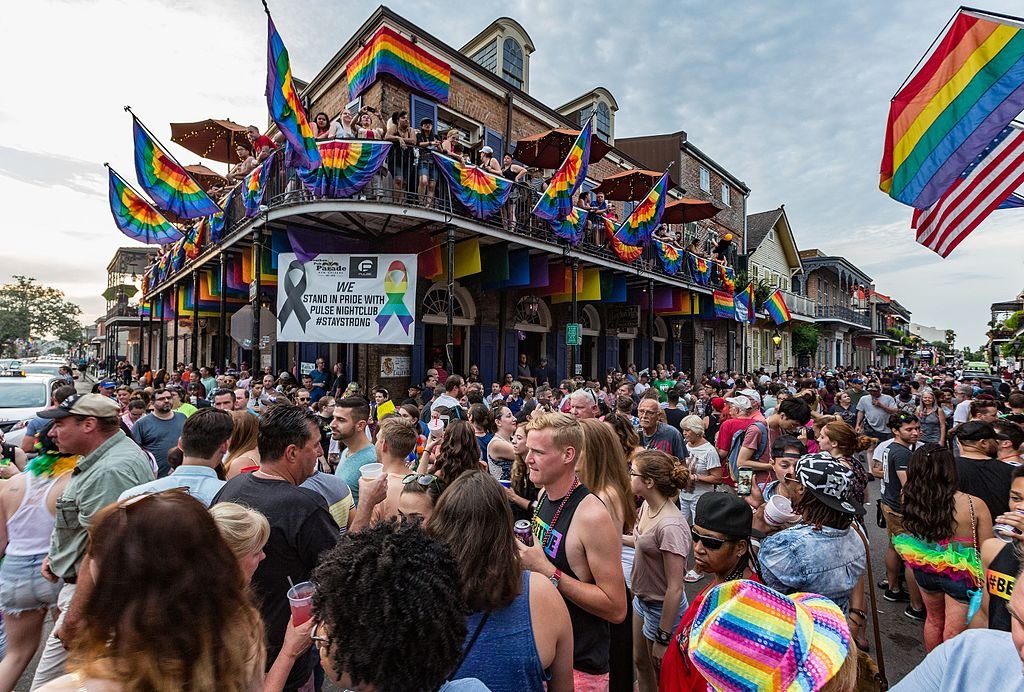Celebrating LGBTQ+ Diversity and History in NOLA
New Orleans is a magnetic city known for its culture and rich history. In the heart of the deep South, New Orleans is often seen as a bright light of acceptance and inclusion for those who live here as well as those that pass through - a place where diversity is welcomed and celebrated. In honor of Gay Pride Month, we decided to take a trip down memory lane to explore the city's LGBTQ+ history, from the parades that dominate the streets to the literary figures who found inspiration here. Here, we offer you a small taste of the magic and history that this city offers visitors. We invite you to join us on a journey through New Orleans' past and present as we celebrate this exciting month.
The Evolution of LGBTQ+ Parades: Now and Then
New Orleans' parades have always been a major source of celebration within the city walls, and the LGBTQ+ community has played quite a role in shaping this tradition. Gay Pride Month is marked by exuberant parades that fill the streets with eye-catching colors and a sense of unity. These parades, both then and now, serve as a platform for expressing individuality and advocating for equal rights.
Historically, LGBTQ+ individuals in New Orleans faced challenges due to social stigma and a deeply rooted culture. Despite these obstacles, the community began organizing its own parades in the 1970s, paving the way for present-day celebrations. Today, the parades during Gay Pride Month showcase the city's openness and embrace of diversity, attracting both locals and tourists from all around the world.
LGBTQ+ Literary Figures and the New Orleans Scene
New Orleans has long been a haven for artists and intellectuals seeking inspiration. Celebrated literary figures like Tennessee Williams and Truman Capote found solace and creativity in the city. Their works not only captivated readers and brought them infamy but also shed light on the struggles and triumphs of queer individuals during their time.
Tennessee Williams was an artist and creator of the controversial play "A Streetcar Named Desire." He spent a large portion of his life in New Orleans and that is abundantly clear in his work. The city's queer community served as a source of inspiration for his characters and their complex relationships. He himself was openly gay at a time when this was not widely accepted. In fact, his play highlighted the need to closet himself and expressed this difficulty in an artistic, moving way.
Truman Capote is another openly gay literary icon that had strong ties to New Orleans, and his captivating storytelling often depicted the city's unique atmosphere and diverse characters. He’s best known for his novella “Breakfast at Tiffany’s,” which has become one of the most iconic films of all time. These are just two of the figures from NOLA that have shown how being their truest selves has not prevented them from becoming wildly successful and influential, regardless of the challenges they had to face.
Southern Decadence: A Celebration of Queer Culture
Since its inception in 1972, this revered celebration has brought together people from all walks of life to honor queer culture and history. Coined the "Gay Mardi Gras," Southern Decadence features extravagant costumes, lively street parties, and a joyful atmosphere that permeates the entire city.
This festival isn’t just a celebration but rather a testament to the progress made in LGBTQ+ rights and visibility. It serves as a reminder of the challenges faced by the community in the past and the ongoing fight for equality.
Remembering Tragedy: The Upstairs Lounge Fire
While New Orleans has witnessed many moments of triumph, it’s also faced tragic events that have shaped the LGBTQ+ community's history. Arguably the most infamous incident is the Upstairs Lounge fire, which took place on June 24, 1973. This heartbreaking arson attack claimed the lives of 32 people and remains one of the deadliest acts of violence against the LGBTQ+ community today.
The Upstairs Lounge was a popular gay bar in the French Quarter, serving as a refuge for the community during a time when discrimination and persecution
were seemingly everywhere. The fire not only caused immense loss of life but also exposed the deep-rooted prejudices and bigotry that the LGBTQ+ community faced.
The tragedy of the Upstairs Lounge fire, although largely forgotten by the mainstream narrative, deserves to be remembered. Taking time to reflect on this devastating occasion is a reminder of how far the community has come and honors the lives lost.
Exploring LGBTQ+ History in New Orleans
At Paved Paradise Tours, we believe in celebrating the rich LGBTQ+ history of New Orleans through engaging and fun-filled tours. Our bike and walking tours offer a unique opportunity to delve into the city's vibrant past, showcasing its landmarks, historic sites, and significant events.
During Gay Pride Month, we touch on these historical places and events and highlight the LGBTQ+ contributions to New Orleans' culture and history. From the iconic places frequented by literary figures like Tennessee Williams and Truman Capote to the sites related to the Southern Decadence Festival, our knowledgeable guides will provide an experience you will never forget.
New Orleans is truly a city of resilience, diversity, and acceptance. At Paved Paradise Tours, we aim to amplify the LGBTQ+ narrative, offering exciting tours that celebrate the community's contributions and shed light on its struggles. We embrace New Orleans' past and pave the way for a more inclusive and empathetic future. Join us on a tour and experience the beauty of this one-of-a-kind city for yourself. Visit our homepage to learn more about our bike and walking tour offerings and experiences.




